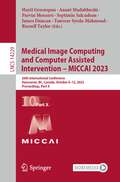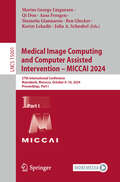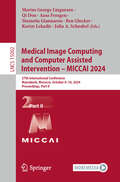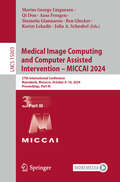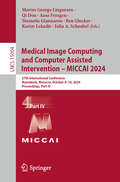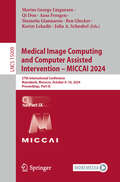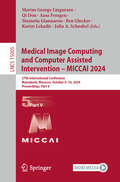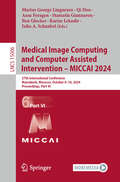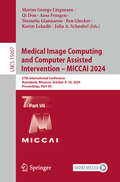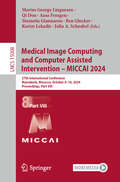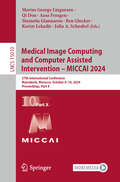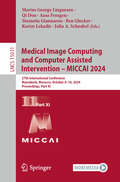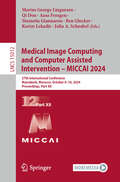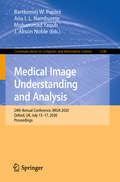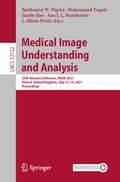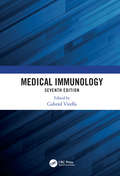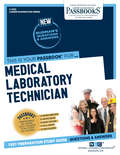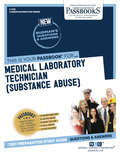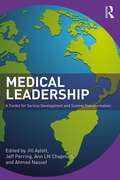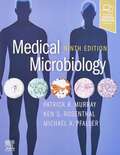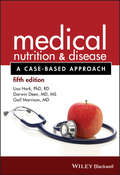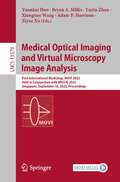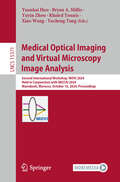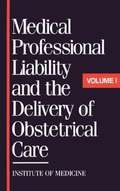- Table View
- List View
Medical Image Computing and Computer Assisted Intervention – MICCAI 2023: 26th International Conference, Vancouver, BC, Canada, October 8–12, 2023, Proceedings, Part X (Lecture Notes in Computer Science #14229)
by James Duncan Tanveer Syeda-Mahmood Hayit Greenspan Anant Madabhushi Russell Taylor Parvin Mousavi Septimiu SalcudeanThe ten-volume set LNCS 14220, 14221, 14222, 14223, 14224, 14225, 14226, 14227, 14228, and 14229 constitutes the refereed proceedings of the 26th International Conference on Medical Image Computing and Computer-Assisted Intervention, MICCAI 2023, which was held in Vancouver, Canada, in October 2023. The 730 revised full papers presented were carefully reviewed and selected from a total of 2250 submissions. The papers are organized in the following topical sections: Part I: Machine learning with limited supervision and machine learning – transfer learning; Part II: Machine learning – learning strategies; machine learning – explainability, bias, and uncertainty; Part III: Machine learning – explainability, bias and uncertainty; image segmentation; Part IV: Image segmentation; Part V: Computer-aided diagnosis; Part VI: Computer-aided diagnosis; computational pathology; Part VII: Clinical applications – abdomen; clinical applications – breast; clinical applications – cardiac; clinical applications – dermatology; clinical applications – fetal imaging; clinical applications – lung; clinical applications – musculoskeletal; clinical applications – oncology; clinical applications – ophthalmology; clinical applications – vascular; Part VIII: Clinical applications – neuroimaging; microscopy; Part IX: Image-guided intervention, surgical planning, and data science; Part X: Image reconstruction and image registration.
Medical Image Computing and Computer Assisted Intervention – MICCAI 2024: 27th International Conference, Marrakesh, Morocco, October 6–10, 2024, Proceedings, Part I (Lecture Notes in Computer Science #15001)
by Marius George Linguraru Aasa Feragen Ben Glocker Julia A. Schnabel Karim Lekadir Qi Dou Stamatia GiannarouThe 12-volume set LNCS 15001 - 15012 constitutes the proceedings of the 27th International Conferenc on Medical Image Computing and Computer Assisted Intervention, MICCAI 2024, which took place in Marrakesh, Morocco, during October 6–10, 2024. MICCAI accepted 857 full papers from 2781 submissions. They focus on neuroimaging; image registration; computational pathology; computer aided diagnosis, treatment response, and outcome prediction; image guided intervention; visualization; surgical planning, and surgical data science; image reconstruction; image segmentation; machine learning; etc.
Medical Image Computing and Computer Assisted Intervention – MICCAI 2024: 27th International Conference, Marrakesh, Morocco, October 6–10, 2024, Proceedings, Part II (Lecture Notes in Computer Science #15002)
by Marius George Linguraru Aasa Feragen Ben Glocker Julia A. Schnabel Karim Lekadir Qi Dou Stamatia GiannarouThe 12-volume set LNCS 15001 - 15012 constitutes the proceedings of the 27th International Conferenc on Medical Image Computing and Computer Assisted Intervention, MICCAI 2024, which took place in Marrakesh, Morocco, during October 6–10, 2024. MICCAI accepted 857 full papers from 2781 submissions. They focus on neuroimaging; image registration; computational pathology; computer aided diagnosis, treatment response, and outcome prediction; image guided intervention; visualization; surgical planning, and surgical data science; image reconstruction; image segmentation; machine learning; etc.
Medical Image Computing and Computer Assisted Intervention – MICCAI 2024: 27th International Conference, Marrakesh, Morocco, October 6–10, 2024, Proceedings, Part III (Lecture Notes in Computer Science #15003)
by Marius George Linguraru Aasa Feragen Ben Glocker Julia A. Schnabel Karim Lekadir Qi Dou Stamatia GiannarouThe 12-volume set LNCS 15001 - 15012 constitutes the proceedings of the 27th International Conferenc on Medical Image Computing and Computer Assisted Intervention, MICCAI 2024, which took place in Marrakesh, Morocco, during October 6–10, 2024. MICCAI accepted 857 full papers from 2781 submissions. They focus on neuroimaging; image registration; computational pathology; computer aided diagnosis, treatment response, and outcome prediction; image guided intervention; visualization; surgical planning, and surgical data science; image reconstruction; image segmentation; machine learning; etc.
Medical Image Computing and Computer Assisted Intervention – MICCAI 2024: 27th International Conference, Marrakesh, Morocco, October 6–10, 2024, Proceedings, Part IV (Lecture Notes in Computer Science #15004)
by Marius George Linguraru Aasa Feragen Ben Glocker Julia A. Schnabel Karim Lekadir Qi Dou Stamatia GiannarouThe 12-volume set LNCS 15001 - 15012 constitutes the proceedings of the 27th International Conferenc on Medical Image Computing and Computer Assisted Intervention, MICCAI 2024, which took place in Marrakesh, Morocco, during October 6–10, 2024. MICCAI accepted 857 full papers from 2781 submissions. They focus on neuroimaging; image registration; computational pathology; computer aided diagnosis, treatment response, and outcome prediction; image guided intervention; visualization; surgical planning, and surgical data science; image reconstruction; image segmentation; machine learning; etc.
Medical Image Computing and Computer Assisted Intervention – MICCAI 2024: 27th International Conference, Marrakesh, Morocco, October 6–10, 2024, Proceedings, Part IX (Lecture Notes in Computer Science #15009)
by Marius George Linguraru Aasa Feragen Ben Glocker Julia A. Schnabel Karim Lekadir Qi Dou Stamatia GiannarouThe 12-volume set LNCS 15001 - 15012 constitutes the proceedings of the 27th International Conferenc on Medical Image Computing and Computer Assisted Intervention, MICCAI 2024, which took place in Marrakesh, Morocco, during October 6–10, 2024. MICCAI accepted 857 full papers from 2781 submissions. They focus on neuroimaging; image registration; computational pathology; computer aided diagnosis, treatment response, and outcome prediction; image guided intervention; visualization; surgical planning, and surgical data science; image reconstruction; image segmentation; machine learning; etc.
Medical Image Computing and Computer Assisted Intervention – MICCAI 2024: 27th International Conference, Marrakesh, Morocco, October 6–10, 2024, Proceedings, Part V (Lecture Notes in Computer Science #15005)
by Marius George Linguraru Aasa Feragen Ben Glocker Julia A. Schnabel Karim Lekadir Qi Dou Stamatia GiannarouThe 12-volume set LNCS 15001 - 15012 constitutes the proceedings of the 27th International Conferenc on Medical Image Computing and Computer Assisted Intervention, MICCAI 2024, which took place in Marrakesh, Morocco, during October 6–10, 2024. MICCAI accepted 857 full papers from 2781 submissions. They focus on neuroimaging; image registration; computational pathology; computer aided diagnosis, treatment response, and outcome prediction; image guided intervention; visualization; surgical planning, and surgical data science; image reconstruction; image segmentation; machine learning; etc.
Medical Image Computing and Computer Assisted Intervention – MICCAI 2024: 27th International Conference, Marrakesh, Morocco, October 6–10, 2024, Proceedings, Part VI (Lecture Notes in Computer Science #15006)
by Marius George Linguraru Aasa Feragen Ben Glocker Julia A. Schnabel Karim Lekadir Qi Dou Stamatia GiannarouThe 12-volume set LNCS 15001 - 15012 constitutes the proceedings of the 27th International Conferenc on Medical Image Computing and Computer Assisted Intervention, MICCAI 2024, which took place in Marrakesh, Morocco, during October 6–10, 2024. MICCAI accepted 857 full papers from 2781 submissions. They focus on neuroimaging; image registration; computational pathology; computer aided diagnosis, treatment response, and outcome prediction; image guided intervention; visualization; surgical planning, and surgical data science; image reconstruction; image segmentation; machine learning; etc.
Medical Image Computing and Computer Assisted Intervention – MICCAI 2024: 27th International Conference, Marrakesh, Morocco, October 6–10, 2024, Proceedings, Part VII (Lecture Notes in Computer Science #15007)
by Marius George Linguraru Aasa Feragen Ben Glocker Julia A. Schnabel Karim Lekadir Qi Dou Stamatia GiannarouThe 12-volume set LNCS 15001 - 15012 constitutes the proceedings of the 27th International Conferenc on Medical Image Computing and Computer Assisted Intervention, MICCAI 2024, which took place in Marrakesh, Morocco, during October 6–10, 2024. MICCAI accepted 857 full papers from 2781 submissions. They focus on neuroimaging; image registration; computational pathology; computer aided diagnosis, treatment response, and outcome prediction; image guided intervention; visualization; surgical planning, and surgical data science; image reconstruction; image segmentation; machine learning; etc.
Medical Image Computing and Computer Assisted Intervention – MICCAI 2024: 27th International Conference, Marrakesh, Morocco, October 6–10, 2024, Proceedings, Part VIII (Lecture Notes in Computer Science #15008)
by Marius George Linguraru Aasa Feragen Ben Glocker Julia A. Schnabel Karim Lekadir Qi Dou Stamatia GiannarouThe 12-volume set LNCS 15001 - 15012 constitutes the proceedings of the 27th International Conferenc on Medical Image Computing and Computer Assisted Intervention, MICCAI 2024, which took place in Marrakesh, Morocco, during October 6–10, 2024. MICCAI accepted 857 full papers from 2781 submissions. They focus on neuroimaging; image registration; computational pathology; computer aided diagnosis, treatment response, and outcome prediction; image guided intervention; visualization; surgical planning, and surgical data science; image reconstruction; image segmentation; machine learning; etc.
Medical Image Computing and Computer Assisted Intervention – MICCAI 2024: 27th International Conference, Marrakesh, Morocco, October 6–10, 2024, Proceedings, Part X (Lecture Notes in Computer Science #15010)
by Marius George Linguraru Aasa Feragen Ben Glocker Julia A. Schnabel Karim Lekadir Qi Dou Stamatia GiannarouThe 12-volume set LNCS 15001 - 15012 constitutes the proceedings of the 27th International Conferenc on Medical Image Computing and Computer Assisted Intervention, MICCAI 2024, which took place in Marrakesh, Morocco, during October 6–10, 2024. MICCAI accepted 857 full papers from 2781 submissions. They focus on neuroimaging; image registration; computational pathology; computer aided diagnosis, treatment response, and outcome prediction; image guided intervention; visualization; surgical planning, and surgical data science; image reconstruction; image segmentation; machine learning; etc.
Medical Image Computing and Computer Assisted Intervention – MICCAI 2024: 27th International Conference, Marrakesh, Morocco, October 6–10, 2024, Proceedings, Part XI (Lecture Notes in Computer Science #15011)
by Marius George Linguraru Aasa Feragen Ben Glocker Julia A. Schnabel Karim Lekadir Qi Dou Stamatia GiannarouThe 12-volume set LNCS 15001 - 15012 constitutes the proceedings of the 27th International Conferenc on Medical Image Computing and Computer Assisted Intervention, MICCAI 2024, which took place in Marrakesh, Morocco, during October 6–10, 2024. MICCAI accepted 857 full papers from 2781 submissions. They focus on neuroimaging; image registration; computational pathology; computer aided diagnosis, treatment response, and outcome prediction; image guided intervention; visualization; surgical planning, and surgical data science; image reconstruction; image segmentation; machine learning; etc.
Medical Image Computing and Computer Assisted Intervention – MICCAI 2024: 27th International Conference, Marrakesh, Morocco, October 6–10, 2024, Proceedings, Part XII (Lecture Notes in Computer Science #15012)
by Marius George Linguraru Aasa Feragen Ben Glocker Julia A. Schnabel Karim Lekadir Qi Dou Stamatia GiannarouThe 12-volume set LNCS 15001 - 15012 constitutes the proceedings of the 27th International Conferenc on Medical Image Computing and Computer Assisted Intervention, MICCAI 2024, which took place in Marrakesh, Morocco, during October 6–10, 2024. MICCAI accepted 857 full papers from 2781 submissions. They focus on neuroimaging; image registration; computational pathology; computer aided diagnosis, treatment response, and outcome prediction; image guided intervention; visualization; surgical planning, and surgical data science; image reconstruction; image segmentation; machine learning; etc.
Medical Image Understanding and Analysis: 24th Annual Conference, MIUA 2020, Oxford, UK, July 15-17, 2020, Proceedings (Communications in Computer and Information Science #1248)
by Bartłomiej W. Papież Ana I. L. Namburete Mohammad Yaqub J. Alison NobleThis book constitutes the refereed proceedings of the 24th Conference on Medical Image Understanding and Analysis, MIUA 2020, held in July 2020. Due to COVID-19 pandemic the conference was held virtually. The 29 full papers and 5 short papers presented were carefully reviewed and selected from 70 submissions. They were organized according to following topical sections: image segmentation; image registration, reconstruction and enhancement; radiomics, predictive models, and quantitative imaging biomarkers; ocular imaging analysis; biomedical simulation and modelling.
Medical Image Understanding and Analysis: 25th Annual Conference, MIUA 2021, Oxford, United Kingdom, July 12–14, 2021, Proceedings (Lecture Notes in Computer Science #12722)
by Bartłomiej W. Papież Ana I. L. Namburete Mohammad Yaqub J. Alison Noble Jianbo JiaoThis book constitutes the refereed proceedings of the 25th Conference on Medical Image Understanding and Analysis, MIUA 2021, held in July 2021. Due to COVID-19 pandemic the conference was held virtually. The 32 full papers and 8 short papers presented were carefully reviewed and selected from 77 submissions. They were organized according to following topical sections: biomarker detection; image registration, and reconstruction; image segmentation; generative models, biomedical simulation and modelling; classification; image enhancement, quality assessment, and data privacy; radiomics, predictive models, and quantitative imaging.
Medical Immunology, 7th Edition
by Gabriel VirellaThis seventh edition of Medical Immunology, now in a full-color presentation, continues to provide a succinct clinical review of the human response to infection while being firmly grounded in science. The authors, distinguished and experienced educators, have been able to anticipate readers’ conceptual challenges and use illustrations, diagrams, and algorithms throughout to simplify complex concepts. With an emphasis on clinical applications, methodological advances, immunological diseases, and innovative interventions, this tried and true guide navigates readers through state-of-the-sciences technologies and demonstrates their implementation in the day-to-day clinical practice of immunology. Key Features Stresses both the basic scientific concepts and clinical correlations to medical practice. Progresses logically from normal immune function to abnormalities and clinical diseases. Reviews the diagnosis, pathogenesis, and management of autoimmune diseases in a concise, manageable and visual manner Continues to be the only current medically-focused immunology text available Provides a succinct review of human response to infection with a focus on diagnostic and clinical immunology
Medical Laboratory Technician: Passbooks Study Guide (Career Examination Series #C-2496)
by National Learning CorporationThe Medical Laboratory Technician Passbook® prepares you for your test by allowing you to take practice exams in the subjects you need to study. It provides hundreds of questions and answers in the areas that will likely be covered on your upcoming exam.
Medical Laboratory Technician: Passbooks Study Guide (Career Examination Series #C-3119)
by National Learning CorporationThe Medical Laboratory Technician (Substance Abuse) Passbook® prepares you for your test by allowing you to take practice exams in the subjects you need to study. It provides hundreds of questions and answers in the areas that will likely be covered on your upcoming exam, including but not limited to; Laboratory principles, practices and terminology; Basic principles of biology, chemistry, and general science; Arithmetic and algebraic reasoning; Analysis for drugs of abuse; and more.
Medical Leadership: A Toolkit for Service Development and System Transformation
by Jill Aylott Jeff Perring Ann Chapman Ahmed NassefToday’s health care systems need doctors and consultants to act as leaders, within the multi-disciplinary team, in addition to carrying out their clinical role. This book identifies the key elements of successful leadership through 'medically led' service development and systems transformation and shows how this benefits patient care, particularly when patients become partners in the process. The authors provide a conceptual framework of medical leadership and a set of scientific methods and tools that make a significant contribution to advancing quality and transforming services in healthcare. On top of this, they present analytical tools which medical professionals can use to support their own improvement or system transformation strategy, including ways of measuring improvement and the returns on investment of medical leadership. Woven throughout the book are real-life case studies from medical leaders across the world, providing students with valuable practical insights. Chapter summaries and reflections are provided to support learning. Medical Leadership will be essential reading for students on medical and clinical leadership courses internationally as well as for all practising doctors, consultants and General Practitioners.
Medical Microbiology
by Patrick R. Murray Michael A. Pfaller Ken RosenthalThe foremost text in this complex and fast-changing field, Medical Microbiology, 9th Edition, provides concise, up-to-date, and understandable explanations of key concepts in medical microbiology, immunology, and the microbes that cause human disease. Clear, engaging coverage of basic principles, immunology, laboratory diagnosis, bacteriology, virology, mycology, and parasitology help you master the essentials of microbiology?effectively preparing you for your coursework, exams, and beyond. Features significant new information on the human microbiome and its influence on the immune and other body systems, and new developments in microbial diagnosis, treatment, diseases, and pathogens. Updates every chapter with state-of-the-art information and current literature citations. Summarizes detailed information in tabular format rather than in lengthy text. Provides review questions at the end of each chapter that correlate basic science with clinical practice. Features clinical cases that illustrate the epidemiology, diagnosis, and treatment of infectious diseases. Introduces microbe chapters with summaries and trigger words for easy review. Highlights the text with clear, colorful figures, clinical photographs, and images that help you visualize the clinical presentation of infections. Offers additional study features online, including 200 self-assessment questions, microscopic images of the microbes, videos, and a new integrating chapter that provides hyperlinks between the microbes, the organ systems that they affect, and their diseases. Enhanced eBook version included with purchase. Your enhanced eBook allows you to access all of the text, figures, and references from the book on a variety of devices.
Medical Nutrition and Disease
by Darwin Deen Lisa Hark Gail MorrisonMedical Nutrition and Disease: A Case-Based Approach is an ideal way for medical students, physician assistant students, dietetic students, dietetic interns and medical residents to advance their nutrition knowledge and skills. Dietitians in clinical practice and dietetic educators will also benefit from the updated nutrition concepts and case-based approach.The 5th edition of this best-selling text has been fully updated and includes 13 chapters and 29 cases, with 6 brand new cases covering many of the scenarios faced in everyday clinicians practice. The text is a practical guide to the role that nutrition plays in disease prevention, treatment and management and also provides 48 self-study continuing education credits for dietitians. Medical Nutrition and Disease:* Features learning objectives and current references in every chapter and case.* Teaches you how to diagnose and manage nutritional problems, integrate nutrition into clinical practice, and answer your patients' most common questions.* Includes nutritional advice for specific patient groups, such as children, teenagers, pregnant women, and older adults. * Includes contributions from nationally recognized nutritionists and physicians who teach nutrition in medical schools, and undergraduate and graduate dietetic programs.Registered dietitians can earn 48 C.E. credits from the Academy of Nutrition and Dietetics by successfully completing the updated multiple choice questions included in the book. Everything has been pre-approved by the Commission on Dietetic Registration and there are no additional fees.
Medical Optical Imaging and Virtual Microscopy Image Analysis: First International Workshop, MOVI 2022, Held in Conjunction with MICCAI 2022, Singapore, September 18, 2022, Proceedings (Lecture Notes in Computer Science #13578)
by Ziyue Xu Yuankai Huo Bryan A. Millis Yuyin Zhou Xiangxue Wang Adam P. HarrisonThis book constitutes the refereed proceedings of the 1st International Workshop on Medical Optical Imaging and Virtual Microscopy Image Analysis, MOVI 2022, held in conjunction with the 25th International Conference on Medical Imaging and Computer-Assisted Intervention, MICCAI 2022, in Singapore, Singapore, in September 2022. The 18 papers presented at MOVI 2022 were carefully reviewed and selected from 25 submissions. The objective of the MOVI workshop is to promote novel scalable and resource-efficient medical image analysis algorithms for high-dimensional image data analy-sis, from optical imaging to virtual microscopy.
Medical Optical Imaging and Virtual Microscopy Image Analysis: Second International Workshop, MOVI 2024, Held in Conjunction with MICCAI 2024, Marrakesh, Morocco, October 10, 2024, Proceedings (Lecture Notes in Computer Science #15371)
by Xiao Wang Yuankai Huo Bryan A. Millis Yuyin Zhou Khaled Younis Yucheng TangThis book constitutes the refereed proceedings of the Second International Workshop on Medical Optical Imaging and Virtual Microscopy Image Analysis, MOVI 2024, held in conjunction with the 26th International Conference on Medical Imaging and Computer-Assisted Intervention, MICCAI 2024, in Marrakesh, Morocco, in October 2024. The 21 regular papers presented at MOVI 2024 were carefully reviewed and selected from 29 submissions. They are grouped into these two topical sections: Medical Optical Imaging and Virtual Microscopy Image Analysis and Kidney Pathology Image segmentation (KPIs) Challenge.
Medical Professional Liability and the Delivery of Obstetrical Care: Volume I
by Committee To Study Medical Professional Liability The Delivery Of Obstetrical CareThis is the first part of an in-depth study focusing on medical liability and its effect on access to and delivery of obstetrical care.The book addresses such questions as:Do liability concerns impede the use of new technologies?Have liability issues affected the physician-patient relationship? Are community health and maternity centers being harmed? What specific remedies are being considered and what are their prospects for success?
Medical Psychosocial And Vocational Aspects Of Disability
by Elliott FitzpatrickThe text contains 33 chapters on selected topics in medicine and rehabilitation. The chapters fall within the following major categories: Rehabilitation Medicine, Common Medical Conditions, Sensory Organ Conditions, Brain and Spinal Cord Conditions, Neuromuscular and Joint Conditions, Psychosocial Conditions, Developmental Conditions, Assistive Technology and Reconstructive Repair, and Genetics. The text also contains an Appendix of Medical Terminology and a detailed Index. The text provides a discussion at the end of each chapter, along with a brief case summary to illustrate how the information is relevant to the person/client. The intent of the authors is to present medical and psychosocial information and make the information relevant to the rehabilitation process for person with disabilities. Although the text is used in a variety of settings, the resource was initially developed and revised every five years specifically for the student in the rehabilitation counseling training programs at major universities around the country. The lead author, Dr. Marty Brodwin, was a long time rehabilitation educator (recently retired) at California State University at Los Angeles.
